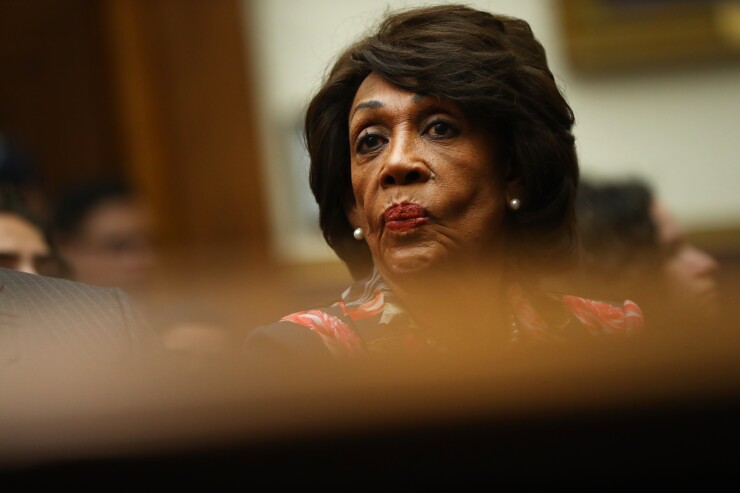WASHINGTON — The chair of the House Financial Services Committee has requested “detailed information” from banks and other businesses describing how they’ve limited or ended their business dealings in Russia since its invasion of Ukraine.
Addressed to more than 30 trade associations — including the American Bankers Association, American Fintech Council, Blockchain Association, Bank Policy Institute, Electronic Transactions Association and U.S. Chamber of Commerce — the
“I have been heartened by how many companies in the financial services industry and in corporate America have taken actions above and beyond those explicitly called for by U.S. sanctions,” Waters wrote. But “the committee currently lacks a clear picture of the extent of these divestments.

“To that end, I am requesting detailed information on the significant actions that America’s financial institutions and businesses have taken to end their relationships and engagements in Russia, with the Kremlin and with businesses that support the Russian government,” Waters said.
Waters asked the trade associations to begin surveying their members within five days of receiving her letter in order to detail their past, current or anticipated activities in Russia, and explain what steps institutions have taken to wind down or end those projects.
Beyond simple information-gathering, the letter also demanded accountability. Waters asked the trade associations to closely monitor and record their members’ responses, telling the groups to “keep a log of your members that have received the letter and those who have replied, and provide the committee this log, without anonymizing the identities of the firms.”
Waters also requested that the trade groups “collate (but not review) their responses and send it to the committee within 20 days of receiving this letter.”
While the letter is an informal request lacking the force of law, it will likely carry some weight among the nation’s financial service trade groups. Banks’ response — or lack of one — to such a request could eventually result in a summons to Capitol Hill.
“We look forward to working with the committee,” said Scott Talbott, senior vice president for government affairs at the Electronic Transactions Association. “ETA members are committed to applying to all applicable sanctions.”
The committee’s top Republican, Rep. Patrick McHenry of North Carolina, was copied on the letter but did not sign it. A spokesperson for McHenry’s office declined to comment on the letter.
Under Waters, the financial services committee has focused on the U.S.-Russian sanctions regime and has
Some of the nation’s top CEOs have spent recent days in close consultation with the White House as the U.S. and its allies mull further sanctions. Jamie Dimon, chairman and CEO of JPMorgan Chase,





